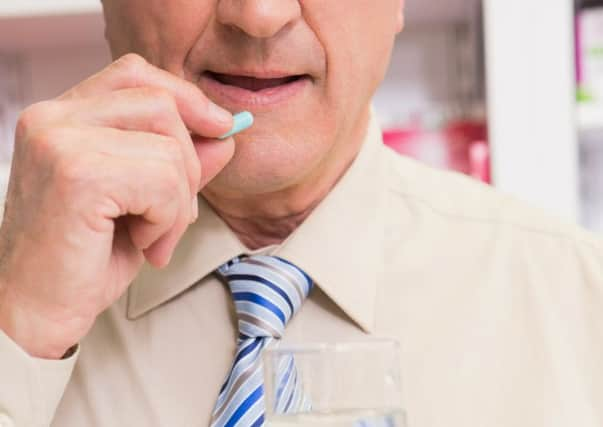David Walsh: Not wrong to take pills for depression '“ some need them


I was absent-mindedly bouncing my right leg while my head swirled with the thoughts of being prescribed antidepressants. It was my worst fear. To be medicated. For drugs to wrestle control over my anxiety-stricken brain rather than using something less invasive to mollify it.
It’s a memory I hadn’t reckoned on re-living until recently when a press release from the Scottish Conservatives crossed my desk decrying a rise in the use of antidepressants.
Advertisement
Hide AdAdvertisement
Hide AdAccording to recent figures released by the NHS Information Services Division, 6.4 million items were prescribed last year (17,500 a day) at a cost of £44.6 million. This represents a modest increase from 2015-2016 when 6.1 million were dispensed at a cost of £44m.
Given that one in three GP appointments in Scotland relate to some form of mental health problem, I personally find these statistics far from troubling.
I don’t recall outraged politicians sending out press releases when NHS Scotland also spent £35.5m on inhalers in 2015-16. After all, only one in 14 Scots suffer from asthma, compared with one in three who are treated every year in Scotland for a mental health issue.
Admittedly, it’s perhaps an unfair comparison to make but it does serve to illustrate a very specific point: we are more comfortable with medication so long as it isn’t treating problems of the mind.
This distinction between mind and body continues to stymie the recognition of mental health problems as physical conditions, especially when a considerable portion of Scotland’s £12.2 billion health budget is devoted to treating them.
To give some perspective, more than £925m was spent on mental health treatment by NHS boards in Scotland last year. Furthermore, the Scottish Government has committed to boosting this to more than a £1bn with a £85.7m budget increase in 2017-18. This includes £10m specifically earmarked for early intervention and prevention.
With this in mind, spending £44m on medication doesn’t seem so grave, does it?
For politicians though, mental health has yet again become a rod to beat their opponents with. In this case, it is the SNP under fire for having pledged to stabilise the rising use of antidepressants and ultimately reduce the number of such prescriptions.
Advertisement
Hide AdAdvertisement
Hide AdThat is not to say that the present Holyrood administration is excelling in its brief. For instance, waiting times continue to be a cause of concern, with only eight out of ten children being seen by Child and Adolescent Mental Health Services within 18 weeks of referral, falling well behind the government’s own target of 90 per cent.
However, it should be noted that any increase in prescriptions could in part be attributed to efforts to finally normalise mental health issues, with people sharing their own experiences, helping to break down the enduring taboos. In short, people are becoming more open to recognising the symptoms of depression and thus seeking professional advice.
That said, it was the enduring stigma attached to antidepressants that steeled my resolve to avoid having to take them at all costs. In hindsight, my concerns were baseless. Had I spoken more openly at the time, I would have heard about how they were making a real difference in the lives of friends and family.
They are not suited to everyone’s health needs and are not a silver bullet by any means. But, in the words of a close friend, “they made me feel calmer and a lot more like me. It’s like suddenly I found myself again, even though I hadn’t realised I’d gone anywhere.”
As it turned out, my GP was surprised (and somewhat relieved) at my determination not to have anything to do with taking pills, and it reaped dividends. I was instead given access to cognitive therapy – but only after a five-month waiting list dwindled.
The Healthy Active Minds exercise programme I was referred to undoubtedly helped to recalibrate my mind. Regular stints in the gym and swimming pool and having access to a personal trainer helped motivate me and restore my self-confidence. I took a step back from the brink.
The ultimate goal of the programme was to rediscover a sense of self-worth and provide a release from the aspects of my life that were causing anxiety. It was a long slog. I had reached such a low ebb by the time I’d finally decided enough was enough that I’d forgotten what “being me” felt like. Therapy felt like running a marathon without any prior training.
And yet while I look back at this as a definitive turning point in dealing with my own depression, I feel uneasy at how quick I was to judge medication or those who choose to take it.
Advertisement
Hide AdAdvertisement
Hide AdFrom my own experience at least, doctors are not choosing to prescribe pills like sweets. If anything, the oversubscription for mental health services and long waiting lists for cognitive treatment and counselling mean doctors have a duty of care to explore all avenues to help their patients.
In some cases, waiting or inaction can have fatal consequences. Despite the benefits they can bring to the lives of those living under the black cloud of mental health, in public discourse at least, it seems the antidepressant is still a very bitter pill for Scots to swallow.